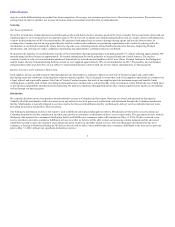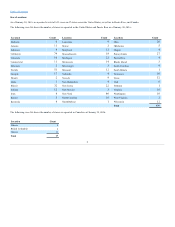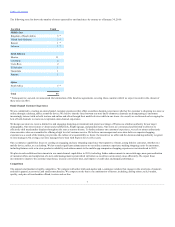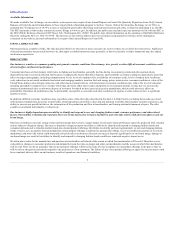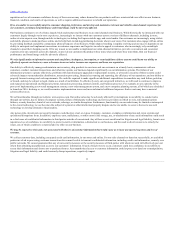Express 2015 Annual Report Download - page 15
Download and view the complete annual report
Please find page 15 of the 2015 Express annual report below. You can navigate through the pages in the report by either clicking on the pages listed below, or by using the keyword search tool below to find specific information within the annual report.
Table of Contents
We rely on third parties to provide us with certain key services for our business. If any of these third parties fails to perform their obligations to us or
declines to provide services to us in the future, we may suffer a disruption to our business. Furthermore, we may be unable to provide these services or
implement substitute arrangements on a timely basis on terms favorable to us.
We rely on many different third parties to provide us with key services. For example, we rely on a third party to operate our central distribution facility in
Columbus, Ohio and to provide certain inbound and outbound transportation and delivery services, distribution services, customs, and brokerage services.
We also rely on another third party to provide us with logistics and other services related to our e-commerce operations. In connection with our sourcing
activities, we rely on approximately 75 buying agents and vendors to help us source products from approximately 306 manufacturing facilities, and in
connection with our marketing activities, we rely on third parties to administer our customer database, our loyalty program, and our gift cards. We also rely
on third-party technology providers to provide us with various technology services and we rely on a third party to administer certain aspects of our payroll. If
any of these third parties fails to perform their obligations to us or declines to provide services to us in the future, we may suffer a disruption to our business
or increased costs. Furthermore, we may be unable to provide these services or implement substitute arrangements on a timely and cost-effective basis on
terms favorable to us.
There are claims made against us from time to time that can result in litigation or regulatory proceedings which could distract management from our
business activities and result in significant liability.
We face the risk of litigation and other claims against us. Litigation and other claims arise in the ordinary course of our business and include commercial
disputes, employment related claims, including wage and hour claims, intellectual property disputes, such as trademark, copyright, and patent infringement
disputes, consumer protection and privacy matters, product-related allegations, and premises liability claims. See Note 13 to our Consolidated Financial
Statements included in "Item 8. Financial Statements and Supplementary Data" in Part II of this Annual Report on Form 10-K.
Any claims could result in litigation against us and could also result in regulatory proceedings being brought against us by various federal and state agencies
that regulate our business, including the United States Equal Employment Opportunity Commission, the Federal Trade Commission, or the Consumer
Product Safety Commission. Often these cases raise complex factual and legal issues, which are subject to risks and uncertainties and could require
significant management time. Litigation and other claims and regulatory proceedings against us could result in unexpected expenses, legal liability, and
injunctions against us or restrictions placed upon us, which could disrupt our operations, preclude us from selling products, or otherwise have a material
adverse effect on our operations, financial results, and our reputation.
Changes in laws, including employment laws and laws related to our merchandise, could make conducting our business more expensive or otherwise
change the way we do business.
We are subject to numerous laws and regulations, including labor and employment, product safety, customs, consumer protection, privacy, zoning laws and
ordinances, intellectual property laws, and other laws that regulate retailers generally or govern the import and export of goods, advertising and promotions,
the sale of merchandise, product content, and the operation of stores and warehouse facilities. If these regulations were to change or were violated by our
management, employees, vendors, or buying agents, the costs of certain goods could increase, or we could experience delays in shipments of our goods, be
subject to fines or penalties, or suffer reputational harm, which could reduce demand for our merchandise and hurt our business and results of operations.
In addition to increased regulatory compliance requirements, changes in laws could make ordinary conduct of our business more expensive or require us to
change the way we do business. For example, changes in federal and state minimum wage laws could continue to raise the wage requirements for certain of
our employees. Other laws related to employee benefits and treatment of employees, including laws related to limitations on employee hours, work
scheduling, supervisory status, leaves of absence, mandated health benefits, or overtime pay, could also negatively impact us, such as by increasing
compensation and benefits costs.
Moreover, changes in product safety or other consumer protection laws, environmental laws, and other regulations, could lead to increased compliance costs.
It is often difficult for us to plan and prepare for potential changes to applicable laws and future compliance costs related to such changes could be material to
us.
We may be unable to protect our trademarks or other intellectual property rights, may be precluded from using trademarks in certain countries, and may
face claims from third parties for intellectual property infringement, any of which could harm our business.
15


